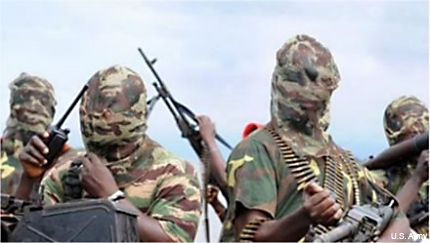US lends comm equipment to fight against Boko Haram
U.S. AFRICOM will provide African partners with communications and intelligence platforms to better enable their forces.

Boko Haram militants in Nigeria.
Boots on the ground might not be an option, but the U.S. military is helping in the fight against Nigerian insurgent group Boko Haram by sharing key communications equipment and intelligence with African allies.
Army Maj. Gen. James Linder, commander of U.S. Special Operations Command for AFRICOM, said that the U.S. will introduce the technologies they will supply to African partners during the annual “Flintlock” counterterrorism exercises taking place in Chad from Feb. 16 to March 9, according to a report from Reuters. The technologies will enable African militaries to better communicate through cellphone, radio and computer networks.
Boko Haram, a militant Islamist group, has killed an estimated 10,000 people in the past year while trying to establish an Islamic state. Nigeria, along with neighbors Chad, Niger, Cameroon and Benin, are forming a joint task force to take on the group, but have said that incompatible communications equipment have hurt their efforts.
That’s where the U.S. military can help. One such piece of technology is the RIOS system, which will enable soldiers to send pictures from remote locations to a command center as well as pin-point personnel. Among various models, RIOS, which stands for Radio Inter-Operability System, generally combines radios, phones, computers and other video platforms with a design for interoperability in a single interface.
“It’s the things that we find from flying over a target and having an FMV, a full motion video, or being able to take pictures, or being able to do a different type of geo-spatial analysis or predictive analysis on the enemy," Linder said.
The military will also be introducing a cloud-based platform for intelligence sharing among African militaries. Intelligence sharing is a critical component, especially in the austere environments which Boko Haram operates. This cloud-based platform will better enable militaries to map locations of targets. The U.S. military has been utilizing cloud-based formats much more frequently and the Intelligence Community has even transitioned to a commercial partner to run its cloud-based platform.
“We need support in terms of intelligence and logistics, above all in communication because the equipment we have comes from different countries, and their support will make our task much easier," the Chadian director of the Flintlock exercises, Brig. Gen. Zakaria Ngobongue, said. "The Americans have aerial capabilities that we do not have."
The communications equipment isn’t the first time U.S. forces have helped in the fight against Boko Haram. Last year, Special Forces troops from the California Army National Guard went to Nigeria to train a newly formed infantry battalion.
Previously, the Army also provided communications assistance in the fight against Ebola in Africa as part of Operation United Assistance. Specifically, the Army provided assistance in the form of their Blue Force Tracking satellite communications system to provide real-time messaging and location as well as its Warfighter Information Network-Tactical system.




